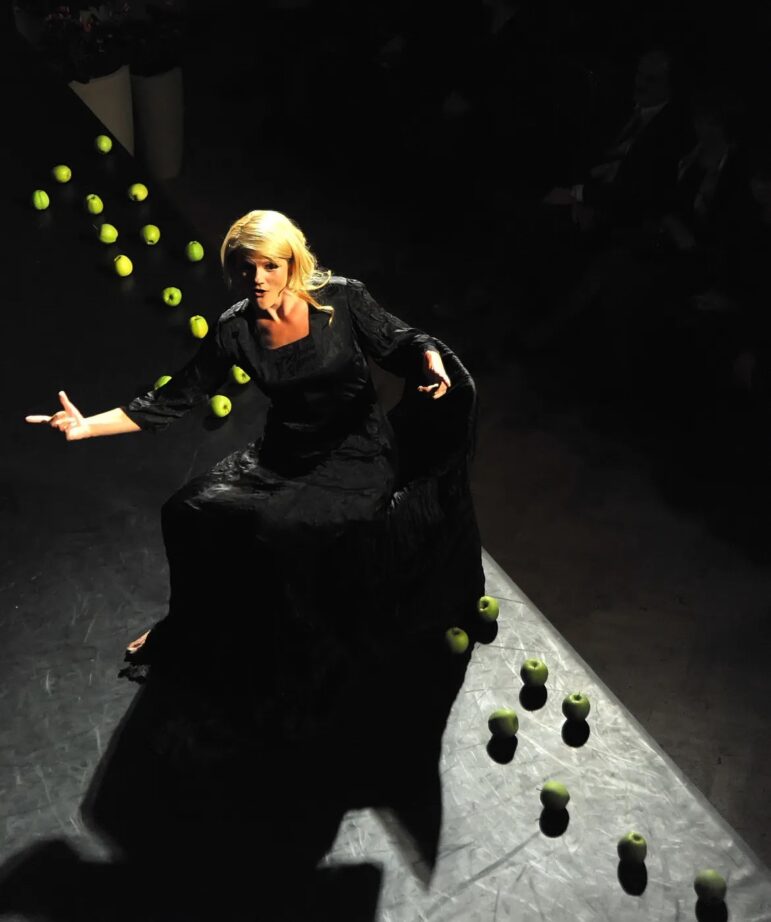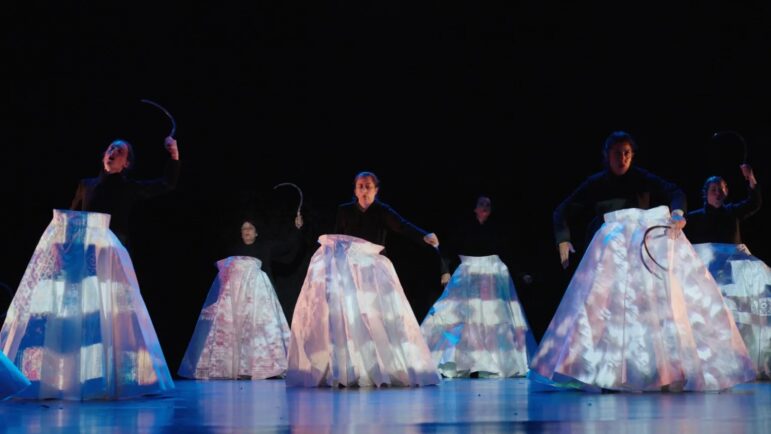Throughout her years of creating new stage works fusing music, drama and visual arts, Karmina Šilec has explored the lives of Balkan women.
Her latest project may be her most intriguing to date. With “BABA: The Life and Death of Stana,” the Slovenian director, composer, author and conductor takes us into the lives of the sworn virgins of the Balkan Highlands—women, she says, who live as men after taking vows of celibacy.
Šilec’s multimedia work makes its world premiere in a new production by the Bay Area’s own Kitka Women’s Vocal Ensemble. Under Šilec’s direction, performances are Feb. 23-26 at San Francisco’s Z Space.

In a recent interview following a rehearsal of “BABA,” Šilec recalled the inspiration for the work.
“I was always interested in female creativity,” she explained. “I did a project about nun composers, and while I was researching that project, I came across stories of these virgins of the Balkans.
“I spent a year at Harvard, researching the anthropology and philosophy of these women, and it was fascinating.”
Šilec, the artistic director of Carmina Slovenica and New Music Theater Choregie, explained that the tradition of sworn virgins derives from an ancient social code found in rural regions of Albania, Montenegro, Bosnia-Herzegovina, Kosovo and Serbia.
These are often women to whom misfortune has befallen: blood feuds or vendettas that take the lives of male relatives, a lack of sons in their households, illness and abandonment by husbands — all are factors that lead women to assume male identities. Šilec says the choice gives such women distinct advantages, including property rights, the avoidance of arranged marriages, and often greater social status.
“It’s a means of survival,” she said. “They change gender because of this patrilineal line. But they don’t want preordained choices. They are not tragic figures; it’s a choice of pride, position and freedom.”
For Shira Cion, Kitka’s executive-artistic director and also one of the group’s vocalists, learning about the women portrayed in “BABA” was an eye-opening experience.
“This phenomenon emerges out of a strictly patriarchal, gender-binary society,” she said. “The transformation is less a sexual one, and more one that allows a woman to become a head of household…it gives women entrance into society, when they were often no more than chattel. It’s really a choice of pride, position and freedom.”

Kitka may be the ideal company to present the new work: throughout the last four decades, the group has explored vocal repertoire from Balkan, Baltic, Caucasus, and Slavic lands, while creating new works inspired by the polyphonic vocal sonorities originating in those parts of the world.
And Šilec, best known for “Toxic Psalms,” a work she premiered at the 2015 Prototype Festival in Brooklyn, has earned acclaim for her multidisciplinary productions.
Cion, who met Šilec while Kitka was conducting an international search for a music director, got acquainted with some of the composer-director’s earlier works as well as her central artistic concept, known as “Choregie,” for creating new music in stage productions.
“I was just blown away,” she recalled. “I’ve long been a fan of composers who are also theater makers, like Robert Wilson and Meredith Monk, and Karmina’s productions were first-class. In Slovenia, she’s a national treasure.”
Over the last few years, the two women met at conferences, and Šilec occasionally came to the Bay Area, working with the Piedmont Choirs and other organizations.
But in 2018, Šilec told Cion that she was embarking on a project on the topic of sworn virgins. Cion applied for a theater grant on the subject, and Kitka was awarded the grant in 2018.

They initially planned “BABA” for a 2021 premiere, but the COVID pandemic forced a postponement. “Now,” said Cion, “we’re able to do the world premiere.”
For these performances, Šilec directs a cast that includes Cion and additional Kitka ensemble members, and two prominent Bay Area guest artists: musician Shira Kammen and theater actor Beth Wilmurt.
Cion said the mix is ideal—Kammen is renowned for her deep knowledge of traditional music, while Wilmurt has earned a reputation as one of the Bay Area’s essential theater artists — and noted that a work like “BABA” doesn’t fit into a neat category.
“Is it opera, vocal theater? It really incorporates all these elements,” she said. “Unlike traditional opera, there aren’t specific characters and no real narrative arc. It’s very fluid, constantly shifting: a dreamlike montage of emotional stages.”
As opening night approached, Šilec said she was pleased with the production. “Working with Kitka, which is so specialized, is very exciting,” she said. “They’re always researching new things. I can use their extended vocal techniques, and that’s a great privilege.”
“It’s not really a narrative project,” she added. “I think of it more like a kind of landscape or scenic adventure. It’s important to me to give ideas, images, emotions —and give space for each individual to have their own interpretation. We don’t close with a clear message. We leave the audience a little open, and we don’t suggest what they should think.”
“BABA: The Life and Death of Stana” is onstage at 8 p.m. Feb. 23-25 and 2 p.m. Feb. 26 at Z Space, 450 Florida St., San Francisco. Tickets are $25-$125. Visit zspace.org/BABA.
